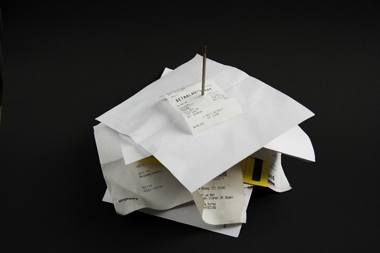Short-Term Keepers
Receipts tend to fall into two categories: those you need to keep at least long enough to double check them against your purchases when you get home and those you need to hold on to for a bit longer. The short-term keepers can be thrown away as soon as you’ve taken care of checking them — I tend to shred these sorts of receipts, but many don’t have any sort of information you really need to worry about.
- Cash Receipts: If you keep track of where you spend your cash (as opposed to using a debit or credit card), you may need to note any receipts for cash spending on your money management software. After that, you can get rid of it.
- Clothing Receipts: Once you’ve put on an outfit and taken off the tags, you can generally get rid of the receipt.
- Restaurant Receipts: It’s generally worth keeping receipts from restaurants at least long enough to check them against your card statement if you left a tip on your card. There is a chance that the tip can be altered or misread, and you’ll need your receipt to dispute it. If everything checks out, and your meal wasn’t a business expense, you can trash the receipt.
There is a school of thought that you should keep a receipt until you get rid off whatever you purchased — for instance, you should hold on to a receipt from the grocery store until you finish off your gallon of milk. That’s because you can get reimbursements in many situations (like recalls) or may need to take the item back. It comes down to your personal choice just how long you want to keep receipts for things like groceries and gas, but generally, less than a month seems like a good choice. Otherwise, though, most personal expenses aren’t even short-term keepers. Your grocery receipt may not even need to make it out of the store’s door with you.
Long-Term Keepers
There are some receipts you may need to hold on to significantly longer than the month it takes for your card statement to arrive. Receipts can be used as proof of a whole list of different things, from tax deductions to warranties, so you’ll need to hold on to a few receipts. I know many people that scan these important receipts to make sure that they have them handy. The IRS does accept scanned receipts, but if you’re trying to work with a credit card company or insurer, you may need to hang on to the original.
- Business Expenses: If you own your own business, most expenses are tax deductible. Hold on to those receipts, though — in the event of an audit, they come in handy. That includes some receipts you might otherwise get rid of, like gas or meals, as long as they are business expenses.
- Job Search Expenses: You can deduct many of the expenses associated with a job search, so hold on to those receipts.
- Employer Reimbursement: With most companies, you’ll need the receipt for any expense you’re reimbursed for. It’s generally worth making a copy to hold on to until you actually get a check — you’ll likely have to turn the original over to your employer.
- Medical Expenses: Between tax deductions and insurance, holding on to any receipts for medication, doctors’ visits and procedures is a must.
- Big Purchases: Hold on to the receipts for big purchases, like appliances and electronics. Defining how big can be tricky, but consider how you paid for it — if you used a credit card, you may have a warranty beyond what the store offered you, as long as you have the original receipt. You may also need receipts for big ticket items in order to make an insurance claim.
- Warranties: If you purchase any product with a warranty, you’ll want to keep the receipt — you may need it to claim the warranty or even prove that you have it. When possible, it makes sense to keep warranty receipts together with the product that they came with. Taping them inside owners’ manuals can be an easy way to keep track of them.
- Donations: It often takes an extra step to get a receipt for a donation — but it’s worth it. You’ll need it if you want to write your donation off on your taxes.
Just how long you need to keep receipts for depends on just who might ask to see them. A good rule of thumb is that anything related to insurance or warranties can be thrown away once you get rid of the item in question — if you replace your stove, for instance, you’ll want to keep the new receipt, but you can throw away the receipt for the old appliance. For the IRS, how long you need to keep receipts can vary significantly: the very longest you might need a set of receipts is seven years.













































